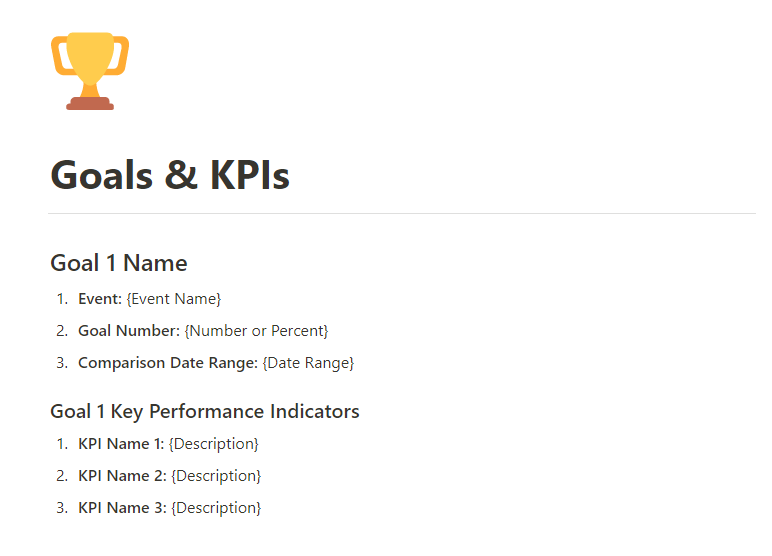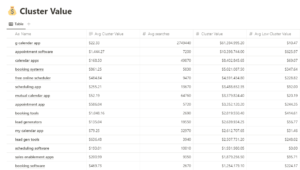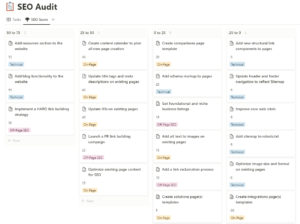How do your SEO efforts align with the overall business strategy?
If your SEO isn’t focused on specific outcomes, you might end up investing your time and effort into the wrong plays, or failing to secure much needed budget and resources.
SEO is often too focused on increasing traffic and rankings, and not focused enough on actual business outcomes.
In this post I’ll cover how to plan actionable goals and KPIs to ensure your SEO strategy aligns with your overall marketing strategy and brand direction.
Example: Company blogs are overrated
The classic example of SEO efforts not aligning with business strategy are generic company blogs.
In my experience, most company blogs generate little to no traffic.
Most company blogs have less than 5 pages that generate traffic and the rest gather dust.
And yet countless hours and dollars are poured into making new posts for these boring company blogs every month.
Blogs can be effective for SEO but often fail
Blogs can be valuable for a business if they actually do it right and generate relevant traffic.
However, most company blogs are failing because getting a blog to succeed on search is much easier said than done.
Everyone made blogs because the internet told us to. We’ve all seen those stats about how companies with blogs generate twice as many leads and other crazy claims.
And now with the rise of generative AI like ChatGPT, content production is rapidly increasing.
Yet most company blogs generate no traffic. From my experience, the only blogs that actually succeed have clear strategies, defined processes, a dedicated budget, and are often worked on by at least 2-3 people.
Finding a company blog that is succeeding with fewer resources than that is much rarer than you think.
Goals are crucial for influencing SEO work
Even if you do manage to get traffic from a blog, it might not help you accomplish your business goals.
Your topics might be so general that the people visiting your website from these pages are so far from being in your funnel that there is almost no point in getting them to your site in the first place.
This is why planning SEO goals and KPIs that actually matter to a business is crucial.
When done correctly, a blog helps acquire traffic that is in the market or soon to be in the market for your business.
How I plan goals and KPIs for SEO.
It starts with understanding the strategy, then setting goals that align with the strategy, then breaking those goals up into KPIs.
1. Business objectives and overall marketing strategy
The goals and KPIs of SEO efforts should align with the overall direction the company is going in.
For example, if you’re a growing SAAS company and your main focus is getting more demo sign-ups, your SEO efforts should be focused on generating demos too.
SEO Goals
Goals for SEO should have a measurable key event, include a goal number, and a comparison date range.
Example: Boost demo sign-ups from organic search by 30% YoY
- Key event: demo sign-ups
- Goal number: 30%
- Comparison date range: YoY
Why these measurements?
- A key event ensures you are measuring an actionable trackable event that ties into the business strategy.
- A goal number represents how much the key event should be increased to justify the effort and cost.
- The date range specifies how long it will take to achieve.
No one cares about how you’re going to connect consumers to engaged cross-channel marketing experiences.
Clear and measurable goals allow clients, stakeholders, and leadership to look directly at the effort vs ROI and decide accordingly.
SEO KPIs
KPIs are the building blocks for business goals.
Key performance indicators for SEO are measurable goals that contribute to a business objective.
For example, if the objective is to generate new demo sign-ups from organic search, one of the KPIs might be how many commercial and transactional keywords for the software are ranking in the top 10.
While measuring rankings in the top 10 does not directly equate to demos, it definitely has an influence on the goal of generating demos.
Another KPI might be the organic conversion rate of the landing pages that generate demos.
Conversion rates are often overlooked in SEO. But if the goal was to get more demos from organic traffic, it would make sense to track and improve the conversion rate too.
Every goal should have its own KPIs. Setting clear objectives like this can have a big influence on the focus of the work.
Effective Goals and KPIs for SEO made easy
- Understand the overall strategy of the business and what the priorities are.
- Know the direction the company is going in.
- Figure out what goals you can set that contribute to the business strategy.
- Chop those goals up into KPIs.
That’s all there is to it. No need to overcomplicate this phase of strategy creation.

With my SEO roadmap template for Notion, you can quickly and easily map out your goals and KPIs, along with other key components of your strategy.



